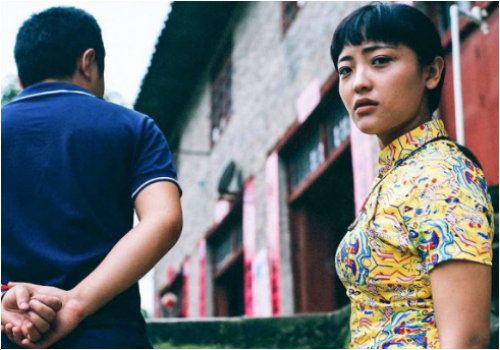China Arts & Entertainment
Must-See Movies: The 5 Winners of The China Film Director’s Guild Awards
The 7th edition of the China Film Director’s Guild Awards (2015) has got China’s netizens talking. The five winners are the must-see movies from 2015.
Published
8 years agoon

The 7th edition of the China Film Director’s Guild Awards (2015) has got China’s netizens talking. The five winners are the must-see movies made in China in 2015.
Made in China films were the focus of attention at the annual China Film Director’s Guild Awards, that were held in Beijing on April 10, and were broadcasted live on TV by CCTV and online by Youku. The event became one of top trending topics on Sina Weibo today (#中国电影导演协会2015#), with netizens discussing the evening’s biggest winners (and what they were wearing).
 One of the winners on the right: actress Bai Baihe (aka ‘Xiao Bai’), looking pretty in a Victoria Beckham dress from the 2016 spring collection. On the left is actress Li Kun.
One of the winners on the right: actress Bai Baihe (aka ‘Xiao Bai’), looking pretty in a Victoria Beckham dress from the 2016 spring collection. On the left is actress Li Kun.
Beijing movie Mr. Six (老炮儿) was the major winner of the night, getting the awards for best film, best director and best male actor. The Assassin (刺客聂隐娘) was the other winner for best original screenplay, and Taiwanese director Hou Hsiao-Hsien (侯孝贤) winning the award for best director from Hong Kong/Taiwan.
[rp4wp]
The China Film Director’s Guild Awards are all about domestically produced films. This year the jury’s selection came from a total of 686 films. Here’s a list of the main awards, followed by a top 5 of China’s winning movies.
The Awards
• Best director: Guan Hu (管虎) for Mr. Six
• Best film: Mr. Six (‘老炮儿’)
• Best actor: Feng Xiaogang (冯小刚) for Mr. Six
• Best actress: Bai Baihe for Go Away Mr. Tumor (‘滚蛋吧!肿瘤君’)
• Best young director: Bi Gan (毕赣) for Kaili Blues (‘路边野餐’)
• Best screenplay: Ah Cheng (阿城) for The Assassin (‘刺客聂隐娘’)
• Jury’s Special Choice: Zhang Yang (张杨) for Paths of the Soul (‘冈仁波齐’)
• Best Outstanding Director: Huang Shuqin (黄蜀芹)
• Best Director from Hong Kong and Taiwan: Hou Hsiao-Hsien (侯孝贤)
The 5 Winning Movies
#1: Mr. Six (‘老炮儿’)
Crime drama revolving around “Mr. Six” (“Lao Pao Er”, Feng Xiaogang), an older Beijinger once known as the leading gangster of the neighbourhood. When his son gets into trouble, Mr. Six is confronted with the differences between the city’s modern underworld and his own gangster past. See the trailer:
According to Cinemasia: “Impeccably played by director-turned-actor Feng Xiaogang, MR. SIX’s stoic titular character eloquently encapsulates China’s struggle to uphold traditions in an era dominated by economical growth.”
#2: The Assassin (‘刺客聂隐娘’)
A drama and martial arts film about a female assassin who accepts a dangerous mission to kill a political leader in seventh-century China. This job puts the assassin in a conundrum, as the man she is supposed to kill is a love from her past. See the trailer:
According to The Telegraph, this is one of the “prettiest films you’ll ever see”.
#3: Go Away Mr Tumor (‘滚蛋吧!肿瘤君’)
Go Away Mr Tumor is a comedy and drama film based on the life of comic book artist Xiong Dun. She was the author of a popular web comic that focused on her battle with cancer.

Xiong died in 2012 at the age of 30. According to Variety, the film is “a slick, glossy but emotionally compelling and humorous portrait of a woman’s losing battle with cancer”.
#4: Kaili Blues (‘路边野餐’)
In the subtropical province of Guizhou, doctor Chen Sheng embarks on a journey to take care of his neglected nephew. The films has already won multiple awards abroad.

According to Hollywood Reporter, this film is “dreamy, poetry-filled and prone to veering off on tangents, the picture teases viewers with such self-assurance it’s difficult to believe the twentysomething director is a first-timer.”
#5: Paths of the Soul (‘冈仁波齐’)
Paths of the Soul could be called “docufiction” about Tibetans travelling 1,200 kilometers to the holy city of Lhasa. During their pilgrimage, they throw themselves to the ground every few metres.

“One of the most gripping and thought-provoking pilgrimages in the history of film”, says IFFR. Director Zhang Yang is known for his previous films, including the 1999 much-praised Shower (洗澡) (-if you have never seen that one, make sure to also put it on your to-watch list!).
– By Manya Koetse
Follow @WhatsOnWeibo
Featured image: promotion photo for Kaili Blues.
©2016 Whatsonweibo. All rights reserved. Do not reproduce our content without permission – you can contact us at info@whatsonweibo.com.
Manya Koetse is the founder and editor-in-chief of whatsonweibo.com. She is a writer, public speaker, and researcher (Sinologist, MPhil) on social trends, digital developments, and new media in an ever-changing China, with a focus on Chinese society, pop culture, and gender issues. She shares her love for hotpot on hotpotambassador.com. Contact at manya@whatsonweibo.com, or follow on Twitter.

China Memes & Viral
Chengdu Disney: The Quirkiest Hotspot in China
How a senior activity park in Chengdu was ‘Disneyfied’ and became a viral hotspot.
Published
3 days agoon
April 12, 2024
How did a common park turn into a buzzing hotspot? By mixing online trends with real-life fun, blending foreign styles with local charm, and adding a dash of humor and absurdity, Chengdu now boasts its very own ‘Chengdu Disney’. We explain the trend.
– By Manya Koetse, co-authored by Ruixin Zhang
Have you heard about Chengdu Disney yet? If not, it’s probably unlike anything you’d imagine. It’s not actually a Disney theme park opening up in Chengdu, but it’s one of the city’s most viral hotspots these days.
What is now known as ‘Chengdu Disney’ all over the Chinese internet is actually a small outdoor park in a residential area in Chengdu’s Yulin area, which also serves as the local senior fitness activity center.
Crowds of young people are coming to this area to take photos and videos, hang out, sing songs, cosplay, and be part of China’s internet culture in an offline setting.
Once Upon a Rap Talent Show
The roots of ‘Chengdu Disney’ can be traced back to the Chinese hip-hop talent show The Rap of China (中国新说唱), where a performer named Nuomi (诺米), also known as Lodmemo, was eliminated by Chinese rapper Boss Shady (谢帝 Xièdì), one of the judges on the show.
Nuomi felt upset about the elimination and a comment made by his idol mentor, who mistakenly referred to a song Nuomi made for his ‘grandma’ instead of his grandfather. His frustration led to a viral livestream where he expressed his anger towards his participation in The Rap of China and Boss Shady.
However, it wasn’t only his anger that caught attention; it was his exaggerated way of speaking and mannerisms. Nuomi, with his Sichuan accent, repeatedly inserted English phrases like “y’know what I’m saying” and gestured as if throwing punches.
His oversized silver chain, sagging pants, and urban streetwear only reinforce the idea that Nuomi is trying a bit too hard to emulate the fashion style of American rappers from the early 2000s, complete with swagger and street credibility.

Lodmemo emulates the style of American rappers in the early 2000s, and he has made it his brand.
Although people mocked him for his wannabe ‘gangsta’ style, Nuomi embraced the teasing and turned it into an opportunity for fame.
He decided to create a diss track titled Xiè Tiān Xièdì 谢天谢帝, “Thank Heaven, Thank Emperor,” a word joke on Boss Shady’s name, which sounds like “Shady” but literally means ‘Thank the Emperor’ in Chinese. A diss track is a hip hop or rap song intended to mock someone else, usually a fellow musician.
In the song, when Nuomi disses Boss Shady (谢帝 Xièdì), he raps in Sichuan accent: “Xièdì Xièdì wǒ yào diss nǐ [谢帝谢帝我要diss你].” The last two words, namely “diss nǐ” actually means “to diss you” but sounds exactly like the Chinese word for ‘Disney’: Díshìní (迪士尼). This was soon picked up by netizens, who found humor in the similarity; it sounded as if the ‘tough’ rapper Nuomi was singing about wanting to go to Disney.

Nuomi and his diss track, from the music video.
Nuomi filmed the music video for this diss track at a senior activity park in Chengdu’s Yulin subdistrict. The music video went viral in late March, and led to the park being nicknamed the ‘Chengdu Disney.’
The particular exercise machine on which Nuomi performed his rap quickly became an iconic landmark on Douyin, as everyone eagerly sought to visit, sit on the same see-saw-style exercise machine, and repeat the phrase, mimicking the viral video.

What began as a homonym led to people ‘Disneyfying’ the park itself, with crowds of visitors flocking to the park, some dressed in Disney-related costumes.

This further developed the concept of a Chengdu ‘Disney’ destination, turning the park playground into the happiest place in Yulin.
Chengdu: China’s Most Relaxed Hip Hop Hotspot
Chengdu holds a special place in China’s underground hip-hop scene, thanks to its vibrant music culture and the presence of many renowned Chinese hip-hop artists who incorporate the Sichuan dialect into their songs and raps.
This is one reason why this ‘Disney’ meme happened in Chengdu and not in any other Chinese city. But beyond its musical significance, the playful spirit of the meme also aligns with Chengdu’s reputation for being an incredibly laid-back city.
In recent years, the pursuit of a certain “relaxed feeling” (sōngchígǎn 松弛感) has gained popularity across the Chinese internet. Sōngchígǎn is a combination of the word for “relaxed,” “loose” or “lax” (松弛) and the word for “feeling” (感). Initially used to describe a particular female aesthetic, the term evolved to represent a lifestyle where individuals strive to maintain a relaxed demeanor, especially in the face of stressful situations.
🌟 Attention!
For 11 years, What’s on Weibo has remained a 100% independent blog, fueled by my passion to write about China’s digital culture and online trends. Over a year ago, we introduced a soft paywall to ensure the sustainability of this platform. I’m grateful to all our loyal readers who’ve subscribed since 2022. Your support has been invaluable. But we need more subscribers to continue our work. If you appreciate our content and want to support independent China reporting, please consider becoming a subscriber. Your support keeps What’s on Weibo going strong!
The concept gained traction online in mid-2022 when a Weibo user shared a story of a family remaining composed when their travel plans were unexpectedly disrupted due to passport issues. Their calm and collected response inspired the adoption of the “relaxed feeling” term (also read here).
Central to embodying this sense of relaxation is being unfazed by others’ opinions and avoiding unnecessary stress or haste out of fear of judgment.
Nowadays, Chinese cities aim to foster this sense of sōngchígǎn. Not too long ago, there were many hot topics suggesting that Chengdu is the most sōngchí 松弛, the most relaxed city in China.
This sentiment is reflected in the ‘Chengdu Disney’ trend, which both pokes fun at a certain hip-hop aesthetic deemed overly relaxed—like the guys who showed up with sagging pants—and embraces a carefree, childlike silliness that resonates with the city’s character and its people.

Mocking sagging pants at ‘Chengdu Disney.’
Despite the influx of visitors to the Chengdu Disney area, authorities have not yet significantly intervened. Community notices urging respect for nearby residents and the presence of police officers to maintain order indicate a relatively hands-off approach. For now, it seems most people are simply enjoying the relaxed atmosphere.
Being Part of the Meme
An important aspect that contributes to the appeal of Chengdu Disney is its nature as an online meme, allowing people to actively participate in it.

Scenes from Chengdu Disney, images via Weibo.
China has a very strong meme culture. Although there are all kinds of memes, from visual to verbal, many Chinese memes incorporate wordplay. In part, this has to do with the nature of Chinese language, as it offers various opportunities for puns, homophones, and linguistic creativity thanks to its tones and characters.
The use of homophones on Chinese social media is as old as Chinese social media itself. One of the most famous examples is the phrase ‘cǎo ní mǎ’ (草泥马), which literally means ‘grass mud horse’, but is pronounced in the same way as the vulgar “f*ck your mother” (which is written with three different characters).
In the case of the Chengdu Disney trend, it combines a verbal meme—stemming from the ‘diss nǐ’ / Díshìní homophone—and a visual meme, where people gather to pose for videos/photos in the same location, repeating the same phrase.
Moreover, the trend bridges the gap between the online and offline worlds, as people come together at the Chengdu playground, forming a tangible community through digital culture.
The fact that this is happening at a residential exercise park for the elderly adds to the humor: it’s a Chengdu take on what “urban” truly means. These colorful exercise machines are a common sight in Chinese parks nationwide and are actually very mundane. Transforming something so normal into something extraordinary is part of the meme.

A 3D-printed model version of the exercise equipment featured in Nuomi’s music video.
Lastly, the incorporation of the Disney element adds a touch of whimsy to the trend. By introducing characters like Snow White and Mickey Mouse, the trend blends American influences (hip-hop, Disney) with local Chengdu culture, creating a captivating and absurd backdrop for a viral phenomenon.
For some people, the pace in which these trends develop is just too quick. On Weibo, one popular tourism blogger (@吴必虎) wrote: “The viral hotspots are truly unpredictable these days. We’re still seeing buzz around the spicy hot pot in Gansu’s Tianshui, meanwhile, a small seesaw originally meant for the elderly in a residential community suddenly turns into “Chengdu Disneyland,” catching the cultural and tourism authorities of Sichuan and even Shanghai Disneyland off guard. Netizens are truly powerful, even making it difficult for me, as a professional cultural tourism researcher, to keep up with them.”
By Manya Koetse, co-authored by Ruixin Zhang
Independently reporting China trends for over a decade. Like what we do? Support us and get the story behind the hashtag by subscribing:
Spotted a mistake or want to add something? Please let us know in comments below or email us. First-time commenters, please be patient – we will have to manually approve your comment before it appears.
©2024 Whatsonweibo. All rights reserved. Do not reproduce our content without permission – you can contact us at info@whatsonweibo.com.
China Music
The Chinese Viral TikTok Song Explained (No, It’s Not About Samsung)
The viral Chinese ‘Samsung’ Tiktok song is also not about cheating or getting back with your ex.
Published
2 weeks agoon
March 31, 2024
Over the past few days, a Chinese song ‘challenge’ has been going viral on TikTok, with various TikTokers from America and beyond mastering the phonetics of a Mandarin song, lip-syncing it and delivering their own dramatic performance.
TikTok user Ajibola Olalekan posted the popular part of the song on March 16, receiving over 71k likes within two weeks, with various TikTokers using the sound for their own videos, some receiving millions of views (watch).
There's this TikTok challenge where people are pouring their hearts into mastering the phonetics of this Chinese song and delivering a dramatic performance. pic.twitter.com/AkVepxec8m
— Manya Koetse (@manyapan) March 31, 2024
TikTok creator Emily, also known as Maverickmother, lip-synced the song from her car, writing: “Admit to your husband you were wrong and apologize or sing in Chinese..”

The popular video maker Azz (@theofficial_azz) also posted a video of himself singing the song, writing: “Admit you were wrong or sing in Chinese.”

TV host and content creator Mark Odea took things a bit further and put on a dramatic performance of himself lip-syncing the song, writing: “I didn’t realize this song was in English.” According to his interpretation of the song, the lyrics go like this:
“Woman cheat
So true in shit sun sun
Would you lie? you shout It’s over Ya
But you are now women itchy
Loud loud itchy ya
Woman cheat send some d
Ching eat chang”
While some think the song is about cheating or getting back with your ex, others also refer to this song as the “Chinese Samsung song,” because they believe the singer is singing about ‘Samsung.’ It’s actually the word cāngsāng (沧桑) they’re hearing, meaning ‘great changes’ or ‘ups and downs.’
The Chinese song in question is “This Life’s Fate” (今生缘) by the Beijing-born singer Chuan Zi (川子, real name Jiang Yachuan 姜亚川, born in 1969). Released in 2009, it is one of his most famous songs, which is about life and friendship.
The part of the song that has recently gone viral on TikTok is as follows:
我们今生注定是沧桑
Wǒmen jīnshēng zhùdìng shì cāngsāng
哭着来要笑着走过呀
Kūzhe lái yào xiàozhe zǒuguò ya
朋友啊让我们一起牢牢铭记呀
Péngyǒu a ràng wǒmen yìqǐ láo láo míngjì ya
我们今生兄弟情谊长
Wǒmen jīnshēng xiōngdì qíngyì cháng
“Our lives are destined to be full of change
We cried when we came [into this world], let’s leave with a smile
My friend, let’s remember very well
We’ll always be like brothers in this life”
By now, the Tiktok trend of foreigners pouring their hearts into mastering a song they may not even understand has also attracted attention on Chinese social media, where many netizens are enjoying the spectacle.
“The feelings of a ‘straight guy’ are just universal,” one top commenter writes (the word used is ‘Zhinan’ 直男, originally referring to heterosexual males, but then came to refer to an entire category of men in China).
“They may not get the exact meaning of the song, but the emotion is there,” others say.
The song, filled with nostalgia, contemplates life and death, emphasizing our shared journey and finding solace in companionship.
If you want to master the entire song yourself, here are the full lyrics (see full song here):
我们今生有缘在路上
Wǒmen jīnshēng yǒu yuán zài lùshàng
In this life, we are destined to be on this journey
只要我们彼此永不忘
Zhǐyào wǒmen bǐcǐ yǒng bù wàng
If only we never forget each other
朋友啊,让我们一起牢牢铭记呀
Péngyǒu a, ràng wǒmen yīqǐ láoláo míngjì ya
My friend, let’s remember very well
别在乎那一些忧和伤
Bié zàihu, nà yīxiē yōu hé shāng
Don’t mind about all that worry and pain
我们今生注定是沧桑
Wǒmen jīnshēng zhùdìng shì cāngsāng
Our lives are destined to be full of change
哭着来要笑着走过呀
Kūzhe lái yào xiàozhe zǒuguò ya
We cried when we came [into this world], let’s leave with a smile
朋友啊,让我们一起牢牢铭记呀
Péngyǒu a, ràng wǒmen yīqǐ láoláo míngjì ya.
My friend, let’s remember very well
我们今生兄弟情谊长
Wǒmen jīnshēng xiōngdì qíngyì cháng
We’ll always be like brothers in this life
朋友啊,让我们一起牢牢铭记呀
Péngyǒu a, ràng wǒmen yīqǐ láoláo míngjì ya
My friend, let’s remember very well
我们今生有缘在路上
Wǒmen jīnshēng yǒu yuán zài lùshàng
In this life, we are destined to be on this journey
只要我们彼此永不忘
Zhǐyào wǒmen bǐcǐ yǒng bù wàng
As long as we never forget each other.
朋友啊,让我们一起牢牢铭记呀
Péngyǒu a, ràng wǒmen yīqǐ láoláo míngjì ya
My friend, let’s remember very well
别在乎,那一些忧和伤
Bié zàihu, nà yīxiē yōu hé shāng
Don’t mind about all that worry and pain
我们今生就像梦一场
Wǒmen jīnshēng jiù xiàng mèng yī chǎng
This life is like a dream.
有你陪喝醉了又何妨
Yǒu nǐ péi hēzuì le yòu héfáng
What’s the harm in getting drunk together with you
朋友啊,让我们一起牢牢铭记呀
Péngyǒu a, ràng wǒmen yīqǐ láoláo míngjì ya
My friend, let’s remember it very well
凡尘过后终了无牵挂
Fánchén guòhòu zhōngle wú qiānguà.
After this mundane life, there will be no worries
朋友啊,让我们一起牢牢铭记呀
Péngyǒu a, ràng wǒmen yīqǐ láoláo míngjì ya.
My friend, let’s remember it very well
By Manya Koetse
Independently reporting China trends for over a decade. Like what we do? Support us and get the story behind the hashtag by subscribing:
Spotted a mistake or want to add something? Please let us know in comments below or email us. First-time commenters, please be patient – we will have to manually approve your comment before it appears.
©2024 Whatsonweibo. All rights reserved. Do not reproduce our content without permission – you can contact us at info@whatsonweibo.com.
Subscribe

Chengdu Disney: The Quirkiest Hotspot in China

Where to Eat and Drink in Beijing: Yellen’s Picks

Weibo Watch: Burning BMWs

More than Malatang: Tianshui’s Recipe for Success

The Chinese Viral TikTok Song Explained (No, It’s Not About Samsung)

The ‘Two Sessions’ Suggestions: Six Proposals Raising Online Discussions

A Snowball Effect: How Cold Harbin Became the Hottest Place in China

Jia Ling Returns to the Limelight with New “YOLO” Movie and 110-Pound Weight Loss Announcement

Show-Inspired Journeys: Chinese Netizens Explore Next Travel Destination Through Favorite TV Series

Top 9 Chinese Movies to Watch This Spring Festival Holiday

Party Slogan, Weibo Hashtag: “The Next China Will Still Be China”

From Pitch to Politics: About the Messy Messi Affair in Hong Kong (Updated)

Weibo Watch: Frogs in Wells

Looking Back on the 2024 CMG Spring Festival Gala: Highs, Lows, and Noteworthy Moments

Two Years After MU5735 Crash: New Report Finds “Nothing Abnormal” Surrounding Deadly Nose Dive
Get in touch
Would you like to become a contributor, or do you have any tips or suggestions? Get in touch here!
Popular Reads
-

 China Insight1 month ago
China Insight1 month agoThe ‘Two Sessions’ Suggestions: Six Proposals Raising Online Discussions
-

 China Insight3 months ago
China Insight3 months agoA Snowball Effect: How Cold Harbin Became the Hottest Place in China
-

 China Arts & Entertainment3 months ago
China Arts & Entertainment3 months agoJia Ling Returns to the Limelight with New “YOLO” Movie and 110-Pound Weight Loss Announcement
-

 China Brands, Marketing & Consumers3 months ago
China Brands, Marketing & Consumers3 months agoShow-Inspired Journeys: Chinese Netizens Explore Next Travel Destination Through Favorite TV Series






Ed Sander
April 11, 2016 at 10:15 pm
Recommendation for ‘Shower’ seconded!